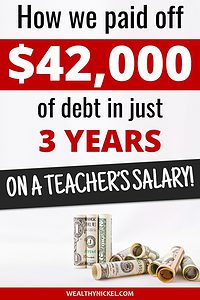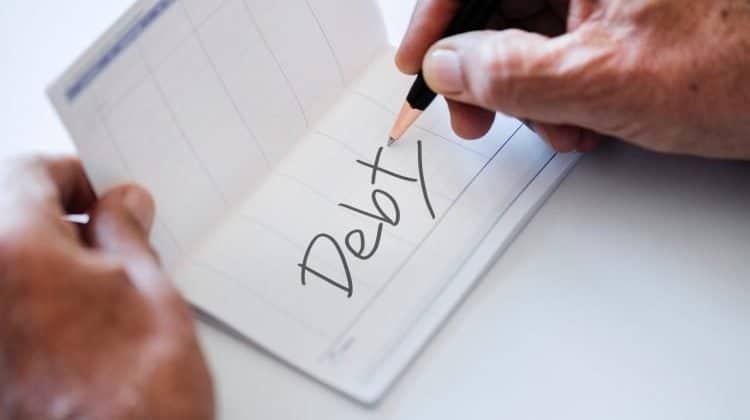 Can you really pay off debt on a teacher’s salary?
Can you really pay off debt on a teacher’s salary?
You’ve heard those success stories of people who pay off a big chunk of debt while earning $30-some thousand per year. You wonder if they can do it, why can’t I?
What’s the secret?
As a school counselor who borrowed over $42,000 in student loans and paid it off in 34 months while earning less than that per year, I’ll reveal the steps that worked for us.
There are commonalities between those inspiring debt payoff success stories, and here are the proven strategies to pay off debt (even if you earn a modest teacher’s salary).
1. UNDERSTAND HOW MUCH DEBT YOU HAVE
If you want to become debt-free, you know where you want to go. But before you can get there, you need to understand where you are on the money map right now.
Once I saw my loan repayment options and the total amount I’d repay with interest if I stuck with the standard plan, I was mortified. I would be paying for those college degree for decades and it would cost me nearly $100,000! Once I dried the tears and decided that was not an option, I was ready to take action and create a plan to become debt-free.
Writing down the following details helped me get a grasp on where I stood financially, and it can help you get started too:
- Debt Name: Who do you owe for each loan?
- Debt Amount: How much is the total loan amount?
- Interest: What is the interest rate?
- Minimum Payment: What is the minimum amount due each month?
Whether you use a notebook, spreadsheet, or printable debt payoff worksheet, gather this basic information to understand your current debt situation is an essential first step.
2. CHOOSE ONE DEBT TO PAY OFF FIRST
Instead of trying to pay off all your debts as once or trying to invest while paying off debt at the same time, I had great results by focusing on one goal, one loan at a time.
You may be familiar with the debt snowball and debt avalanche methods. I went the debt avalanche method but know many others who successfully used the snowball method. Both will lead you to the same debt-free destination.
Whether you choose to tackle the smallest loan amount first (snowball) or tackle the highest interest rate first (avalanche), the common theme here is to pay the minimum amount due on all your loans except one! Chip away with extra payments on that one loan until it’s gone, then go after the next one.
Once you choose a debt payoff method, rearrange your debt list in the order you want to pay them off. This is your debt payoff plan of attack.
Next, you need to find extra money to pay off that first debt with.
3. CREATE A BUDGET EACH MONTH
Ok, I know “budget” is a word that people love to hate. But as someone who didn’t earn a lot of money, doing a zero-based budget each month was an critical piece of the puzzle. There’s no way we would have “found” over $42,000 plus interest in less than 3 years without looking carefully at our money each month.
Once I saw the budget categories where my money was going, I was able to find places to save. Like most people, housing and food consumed a lot of our monthly income.
In order to cut our monthly expenses, we did things like:
- Bought a small, old home to keep our mortgage payment less than 25% of our take-home pay
- Used a meal planning worksheet to plan our meals
- Took leftovers to work for lunch
- Used cashback apps that pay you money like Ebates or Mr. Rebates
- Drove old cars so we didn’t have car payments
- Carpooled to work with co-workers
- Bartered with the satellite TV provider anytime they increased rates
If you take a careful look at how much money you’re earning and where it’s going, you’ll likely find some places you can cut back too. This can really accelerate your debt payoff goal.
4. SET A LOFTY YET REALISTIC GOAL
Next, you’re ready to set a goal for paying off your debt. It may change over time, but that’s ok.
When I reached this part of the process, my consolidated student loans were on a 20-year repayment plan. From my first budget, I thought the absolute fastest I could pay them off was 8 years given my income. This looked realistic on paper yet felt lofty.
The best financial goals are:
- Specific enough that you’ll know exactly when you achieve it
- Realistic given your current income and circumstances
- Based on a deadline so you know when you’re trying to achieve the goal by
I ended up paying off my debt 5 years faster than I originally thought possible…so tackling debt doesn’t end here. If you truly want to pay off debt fast, there’s more you can do.

5. START A SIDE HUSTLE TO INCREASE YOUR INCOME
Budgeting can show you places you can save money, such as monthly subscriptions, dining out, overdraft fees, or cable bills. The other half of the equation is to increase your income so you have even more available to pay off debt.
Since our teacher incomes were on a set pay schedule, negotiating a raise was not an option for us although it could be for others. I taught summer school one summer but didn’t do anything else as a side hustle. Knowing what I know now, I wish I had.
Even though I’m a full-time stay-at-home mom of two toddlers, I consistently find ways to make money from home to increase our family’s income and avoid living paycheck-to-paycheck. Most of my income has been earned by:
I wish I had known then about all the side hustle opportunities back before I had kids…when I had WAY more time! Just think how much you could supercharge your debt payoff if you earned a few hundred or few thousand dollars per month.
6. FIND YOUR NERDY YET SUPPORTIVE MONEY TRIBE
Finding a community of people who were open to talking about money and had financial situations I respected was another key to success. I also found the Dave Ramsey Show podcast during this time.
While I don’t agree with everything Dave Ramsey advises about getting out of debt, his advice motivated me to get even more intense about tackling our debt. The paraphrased Dave quotes that really stuck with me during this time were:
- Live like no one else so later you can live (and give) like no one else
- If you don’t tell your money where to go, you’ll wonder where it all went
- Normal is broke. Be weird.
After I started listening to his show, my husband eventually joined the bandwagon. Our commutes to work turned from music and sports talk to financial advice and debt-free screams. Simply by listening to his show, we started doing zero-based budgeting, found more ways to save money, and started to believe we could pay off our debt even faster (despite our modest incomes).
7. AUTOMATE, BUT CHECK IN ON YOUR PROGRESS
The final piece of the puzzle was automating—yet checking in.
Automating your monthly payment will ensure you don’t forget to pay your bill and have to pay a penalty. However, being completely hands-off may not be the best option.
I tried to automate the additional principal payment I decided to make each month to hit my goal. However, they could never get the payment right. They’d take out the wrong amount. They’d take it out days or weeks late. After many frustrating hours on the phone, I finally canceled my auto payments altogether.
I refused to let their glitches get in the way of my goal. So I manually made my regular payment and an extra payment each month.
This glitch may have actually helped because the interest I saw accrue whenever I logged into my account made me sick. So sick…that I kept digging deeper into our budget to find more ways to save money, pay extra on the debt, and finally eliminate those awful student loans.
8. FIND EVEN MORE MONEY FOR EXTRA PAYMENTS
You might be wondering how I went from 8 years down to 34 months. No, I didn’t win the lottery or receive a large inheritance. A big difference-maker for us was when we switched from “kind of budgeting” to doing an actual zero-based budget meeting with my husband before every month began. Together, we had to think about upcoming expenses and set goals for our money before it came into our account. This helped us become proactive and even more intentional with how we spent our money.
It was eye-opening for me when I actually dug into the charges on our credit cards too. We paid them in full every month, but instead of just putting a lump sum of “ $500 for credit card” on my budget, I actually broke it down to see where exactly all that “credit card” money was going. This awareness made both my husband and I think twice before swiping and both of our credit card bills started going down.
We also started using birthday or Christmas gifts of cash toward the debt. Tax returns went toward the debt. We got so intense that even though our friends made fun of us for not having smart phones, we stuck to our “dumb” phones and even took texting off our phone plan.
A little here and a little there added up to a lot of savings over a few years. By making extra principal payments of $100-$1,000 per month, we knocked down the principal of the loan fast instead of just paying the interest and barely touching the principal.
RECAP TO GETTING OUT OF DEBT
We didn’t totally stop spending money. We still had a destination wedding and took a one-year anniversary vacation during this time but we kept them small and inexpensive. We didn’t live in our parents’ basement or anything like that. But finding room in our monthly budget to pay extra on the loans ultimately came down to intentionally living a simple lifestyle.
We learned a lot about our loans, interest, and our overall financial situation. We didn’t take on anymore debt and avoided the temptation to buy a big home, a house full of new furniture, or the latest technology. And by creating a zero-based budget, we planned how we wanted to spend our money ahead of time instead of just reviewing how we spent it after-the-fact, hoping it went where we wanted.
In the end, we paid off over $42,000 in college debt in just 34 months. We saved around $27,000 in interest – almost as much as a new teacher earns for an entire year of work!
Our next step is to help make sure our kids don’t end up in the same financial mess we had after college. So follow these steps if you’re really ready to pay off your debt even if you have a modest income. The taste of freedom that comes with not owing anyone a dime is worth it.
[ad_2]
Source link